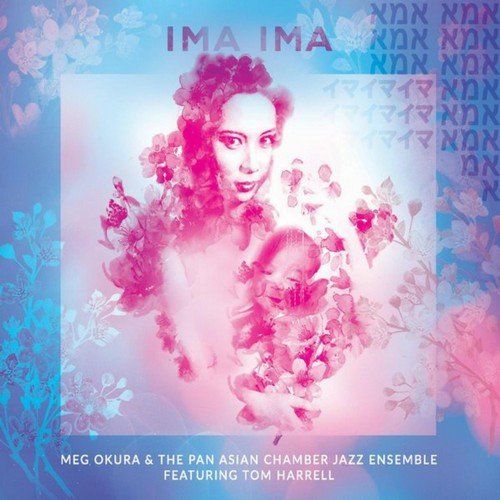
Meg Okura & the Pan Asian Chamber Jazz Ensemble - Ima Ima (feat. Tom Harrell) (2018)
BAND/ARTIST: Meg Okura & the Pan Asian Chamber Jazz Ensemble
- Title: Ima Ima (feat. Tom Harrell)
- Year Of Release: 2018
- Label: Meg Okura & the Pan Asian Chamber Jazz Ensemble
- Genre: world, jazz, avant-garde, chamber jazz, contemporary jazz, neo-classical
- Quality: MP3 320 kbps / FLAC (tracks)
- Total Time: 57:58 min
- Total Size: 133 / 319 MB
- WebSite: Album Preview
I became an ima (“mom” in Hebrew) seven years ago. Ima also means “now” in Japanese. So I am an ima now, and always will be. The title track Ima Ima (Track 1) is a celebration of womanhood and motherhood, though I don’t believe motherhood automatically makes a woman a better person, or that all mothers are awesome just because. But for many of us, motherhood lets us experience and appreciate things we would never have had a chance to appreciate otherwise. Parents also jump through some unbelievable hoops for their children. For me, it was the arduous process of becoming a Jew just so I could raise our daughter as a Jew. But what this has brought to our lives has been beyond extraordinary, despite the religion. And I am thankful to my daughter. People often refer to a woman’s bearing a child as an “interruption”. For me, it actually has been a constant state of interruptions. As it turns out, the earliest compositions on this album date back to my pregnancy. For example, “A Night Insomnia” (Track 3) is filled with disruptive figures. After the Tchaikovsky-esque opening, it goes to the dotted eighth notes figure that hauntingly repeats throughout almost the entire piece. After the groove comes in on top of this ostinato, the drums stop suddenly for two measures, like a heart attack. When drums return again with the groove, they don’t stay there for long because the ostinato functions as the basis for the series of rapid metric modulations to come. The piece ends abruptly, after the chaotic soprano saxophone solo by Newsome. But there are things much worse than my child interrupting me while I was trying to prepare for a gig. In the summer of 2014, some of my friends were living in Israel with their small children while the cities were constantly under attack. They told me what was happening over there – the loud alarms going off, while they guided their children to safety in a shelter. Israel is a beautiful country. I had fallen in love with it three years earlier, while performing there. A Summer in Jerusalem (Track 2) is based on my romantic novel – only I don’t know how to write novels. I wrote this piece with a storyline in mind about two young people (a Jew and Arab) who fall in love in summer, despite everything that is happening in Israel. Black Rain (Track 6) is another war-related piece, only this one is from WWII. In Japan, Black Rain (kuroi ame) is the nuclear fallout from the Hiroshima and Nagasaki atomic bombs. This is just another story to pass on to my daughter in addition to what she will learn at school about that horrific period. One of my close relatives was a hibakusha (an Atomic Bomb survivor) – a very famous rakugoka (Edoya Nekohachi) who passed away in 2001 in my hometown of Ome. I used a Japanese minor pentatonic scale for the central theme and later juxtaposed it with jazz chord changes similar to those in Invitation. Another piece in which I have incorporated the Japanese minor pentatonic scale is Tomiya (Track 7). The piece is dedicated to Tomiya Okura, my father. In this composition I recreated the rhythm of a taiko drum ensemble by playing double and quadruple stops on the violin, and plucking two strings with my left hand while bowing the other two strings. The irony is that my father never allowed us to be a part of any kind of festival (matsuri), which is where children would normally hear taiko drumming. Since we were devout Christians, we always avoided activities involving other religions. The sound I emulate here is the sound Tomiya would have heard while growing up in Ome in the wake of WWII. Because my parents raised us strictly Protestant, I knew little about Buddhism. My parents went out of their way to shield us from it. When Rubin Museum asked me to compose a piece based on some artwork there, I chose Birth of Shakyamuni, a collage, which depicts the birth narrative of Buddha. And I finally discovered a commonality between Jesus and Buddha – the miraculous births! Buddha was conceived when a white elephant touched his mother’s side. The Birth of Shakyamuni (Track 4) consists of the Introduction, The White Elephant, Chase, Lustration, and Coda. Each section is performed back-to-back, without a break. Some of my peers describe my works as “unique”, implying “not exactly jazz.” Blues in Jade (Track 5) is my through-composed work based strictly on the blues form. What could be more jazz than the blues?
01 - Ima Ima
02 - A Summer in Jerusalem
03 - A Night Insomnia
04 - Birth of Shakyamuni
05 - Blues in Jade
06 - Black Rain
07 - Tomiya
01 - Ima Ima
02 - A Summer in Jerusalem
03 - A Night Insomnia
04 - Birth of Shakyamuni
05 - Blues in Jade
06 - Black Rain
07 - Tomiya
Year 2018 | Jazz | World | FLAC / APE | Mp3
As a ISRA.CLOUD's PREMIUM member you will have the following benefits:
- Unlimited high speed downloads
- Download directly without waiting time
- Unlimited parallel downloads
- Support for download accelerators
- No advertising
- Resume broken downloads


